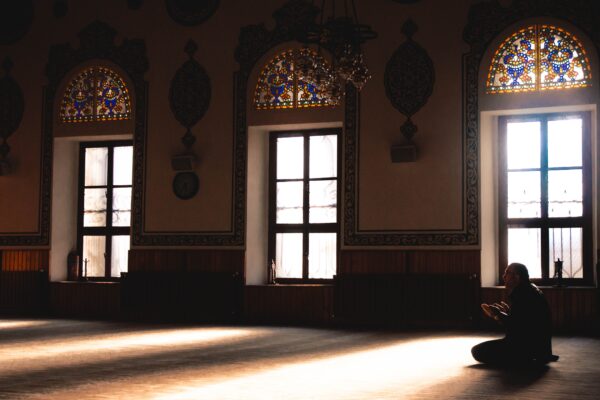These people are the most honourable in the eyes of Allah (swt)
These people are the most honourable in the eyes of Allah (swt)
The Holy Quran was sent down in order as a huda, a righteous guidance for people to learn from and to utilise as a means to gain closeness to Allah (swt). One example of the best of guidance comes from Chapter 49 of the Quran, Surah Hujurat, which came down to the Prophet in the city of Medina. In this short Chapter, (containing on 18 verses) Allah (swt) instructs us on how to deal with one another with the best social etiquette. Here are 9 examples from this Chapter:
1. Fa Tabayanu
يَـٰٓأَيُّہَا ٱلَّذِينَ ءَامَنُوٓاْ إِن جَآءَكُمۡ فَاسِقُۢ بِنَبَإٍ۬ فَتَبَيَّنُوٓاْ أَن تُصِيبُواْ قَوۡمَۢا بِجَهَـٰلَةٍ۬
“Oh you who believe; if an evil-doer comes to you with a report, look carefully into it, lest you harm a people in ignorance.” [Verse 6]
Here the believers are instructed to look carefully into the news and reports that are given to us, in order to distinguish right from wrong, ahead of disseminating it to others. If we don’t do this, it becomes easy to distribute false information and this can harm those around us who may take the reports at face value.
2. Fa Aslihu
وَإِن طَآٮِٕفَتَانِ مِنَ ٱلۡمُؤۡمِنِينَ ٱقۡتَتَلُواْ فَأَصۡلِحُواْ بَيۡنَہُمَاۖ
“And if two parties of the believers quarrel, make peace between them.” [Verse 9]
This one is pretty self-explanatory. If there is a group who is quarreling, taking the initiative to resolve the problems between them is something that is not only rewarding in this life but also in the hereafter. The same verse continues to discuss justice:
3. Wa Aqsitu
فَإِن فَآءَتۡ فَأَصۡلِحُواْ بَيۡنَہُمَا بِٱلۡعَدۡلِ وَأَقۡسِطُوٓاْۖ إِنَّ ٱللَّهَ يُحِبُّ ٱلۡمُقۡسِطِينَ
“Then if it returns [the quarrel] make peace between them with justice and act equitably; surely Allah loves those who act equitably.” [Verse 9]
Again, it reminds us to keep the peace but to ensure that one is fair and just in the resolving of this issue. Further to this, it serves as a reminder as to the qualities that Allah (swt) wishes for the believers to have and in this case, it is being equitable.
4. La Yaskhar
يَـٰٓأَيُّہَا ٱلَّذِينَ ءَامَنُواْ لَا يَسۡخَرۡ قَوۡمٌ۬ مِّن قَوۡمٍ عَسَىٰٓ أَن يَكُونُواْ خَيۡرً۬ا مِّنۡہُمۡ
“Oh you who believe; let not (one) people laugh at (another) people, perchance they may be better than them.” [Verse 11]
It is often we look down on people as we believe that they are lesser than us in some way. Here we are instructed not to laugh or mock others, especially since there is a chance that they are better than us in some way or another. This verse then continues to discuss name calling:
5/6. Wa La Talmizzu, Wa La Tanabazu
وَلَا تَلۡمِزُوٓاْ أَنفُسَكُمۡ وَلَا تَنَابَزُواْ بِٱلۡأَلۡقَـٰبِۖ
“And do not find fault with your own people, nor call one another nicknames.” [Verse 11]
This leads on from the previous part and reinforces the fact that name calling may be a side-effect of putting yourself on a pedestal ahead of others. It also reminds us to avoid doing one of the things that is extremely rife in a good many communities, and that is finding fault within our own ranks.
7. Ijtanibu Katheeran Minal Than
يَـٰٓأَيُّہَا ٱلَّذِينَ ءَامَنُواْ ٱجۡتَنِبُواْ كَثِيرً۬ا مِّنَ ٱلظَّنِّ إِنَّ بَعۡضَ ٱلظَّنِّ إِثۡمٌ۬ۖ
“Oh you who believe; avoid most of suspicion for surely, suspicion in some cases is a sin.” [Verse 12]
Many times we tend to base our ideas on people on sneaking suspicions on who they are rather than who they truly may be. Allah (swt) also warns us that at times, suspicion is akin to a sin.
8. Wa La Tajassasu
وَلَا تَجَسَّسُواْ
“And do not spy on one another.” [Verse 12]
This one really is a no-brainer but is something so incredibly vital to so many of our modern day surveillance states. With this, Alla (swt) reminds us that for the best social etiquette, one should avoid it.
9. Wa La Yaghtaaba Ba’thukom Ba’th
وَلَا يَغۡتَب بَّعۡضُكُم بَعۡضًاۚ أَيُحِبُّ أَحَدُڪُمۡ أَن يَأۡڪُلَ لَحۡمَ أَخِيهِ مَيۡتً۬ا فَكَرِهۡتُمُوهُۚ
“And do not backbite one another. Does one of you like to eat the flesh of his dead brother, and you abhor it.” [Verse 12]
The Quran here brings forth a comparison to highlight how heinous the act of backbiting is, and likens it to devouring the flesh of your own brother. For a functioning society and for people of high morals, one should not backbite.
10. Inna Akramakom ‘ind Allah Atqaakom
إِنَّ أَڪۡرَمَكُمۡ عِندَ ٱللَّهِ أَتۡقَٮٰكُمۡۚ
“Surely the most honourable of you with Allah is the one among you who is most careful of his duty.” [Verse 13]
The start of this verse is usually cited when it comes to discussion on marriage and equality, reminding people that they were created of a male and a female and into tribes and families so that we may get to know one another. The verse then continues to highlight one of the most important verses on equality, reminding us that nothing puts one human over the other in the eyes of Allah, not gender, faith, tribe or anything in between; the ones who are most honourable in the eyes of the Lord is one who carries himself with taqwa, piety, and God consciousness.
This post was inspired by this article.





